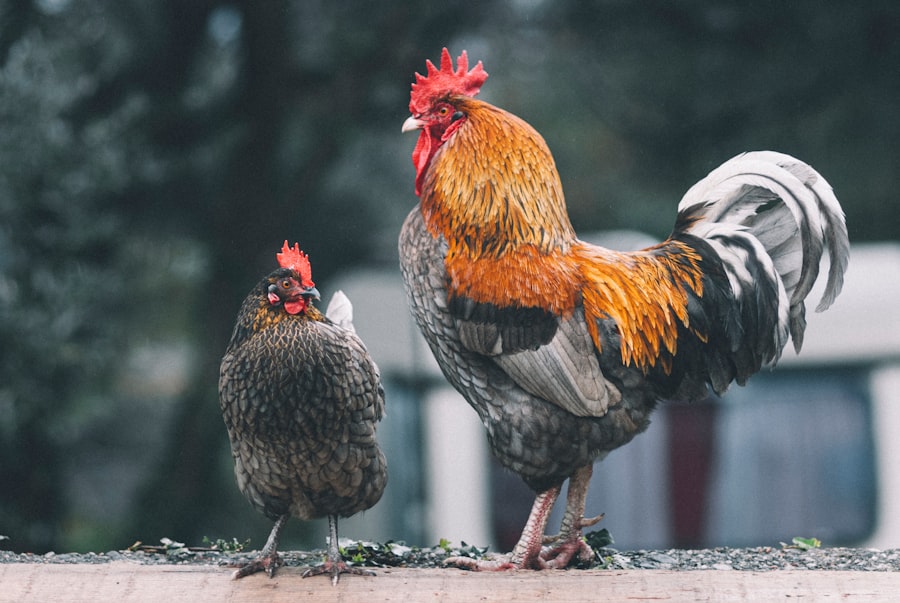Raising free range chickens has become increasingly popular in recent years, as more people are becoming aware of the benefits of this type of chicken farming. Free range chickens are allowed to roam freely and forage for their own food, resulting in eggs and meat that are more nutritious and flavorful. However, there are also challenges that come with raising free range chickens, such as the risk of predators and disease, as well as the potential damage they can cause to gardens and landscaping. In this article, we will explore the benefits and challenges of raising free range chickens, as well as provide tips and strategies for successfully raising a happy and healthy flock.
Key Takeaways
- Free range chickens have numerous benefits, including better health and nutrition, improved egg quality, and reduced environmental impact.
- However, there are also challenges to raising free range chickens, such as increased risk of predation and the need for more space and resources.
- Understanding chicken behavior is crucial for designing a coop that meets their needs and keeps them safe.
- Choosing the right location for the coop, as well as using appropriate fencing and netting, can help prevent predators from accessing the flock.
- Planting chicken-friendly gardens and using natural deterrents can also help keep chickens healthy and happy, while regular maintenance is essential for their overall well-being.
The Benefits of Free Range Chickens
One of the main benefits of raising free range chickens is the nutritional value of their eggs and meat. Free range eggs have been found to contain higher levels of omega-3 fatty acids, vitamin E, and beta-carotene compared to eggs from chickens raised in confinement. Similarly, free range chicken meat is leaner and has a richer flavor due to the varied diet and exercise that free range chickens enjoy. By allowing chickens to roam freely and forage for their own food, they are able to consume a wider variety of plants, insects, and other natural food sources, resulting in a more nutritious end product.
In addition to the nutritional benefits, raising free range chickens is also better for the environment. Free range chickens have a lower carbon footprint compared to chickens raised in confinement. They have access to fresh air and sunlight, which helps reduce the need for artificial lighting and ventilation systems. Furthermore, free range chickens have the opportunity to naturally fertilize the soil with their droppings, which improves soil health and reduces the need for chemical fertilizers.
From an ethical standpoint, raising chickens in a free range environment allows them to exhibit natural behaviors and live a more fulfilling life. Chickens are social animals that thrive in small flocks, and they enjoy the freedom to explore, scratch, and dust bathe. By providing them with a free range environment, we are giving them the opportunity to express their natural instincts and behaviors, which is not possible in a confined space.
The Challenges of Free Range Chickens
While there are many benefits to raising free range chickens, there are also challenges that come with this type of farming. One of the main challenges is the risk of predators and disease. Free range chickens are more vulnerable to attacks from predators such as foxes, raccoons, and hawks. It is important to have proper fencing and netting in place to protect the chickens from these threats. Additionally, free range chickens are more exposed to diseases that can be transmitted through contact with wild birds or contaminated soil. Regular monitoring and vaccination are essential to ensure the health of the flock.
Another challenge of raising free range chickens is the potential damage they can cause to gardens and landscaping. Chickens have a natural instinct to scratch and dig in the soil, which can lead to uprooted plants and damaged landscaping. It is important to provide designated areas for the chickens to forage and explore, while also protecting sensitive areas with fencing or netting.
Understanding Chicken Behavior
To successfully raise free range chickens, it is important to understand their natural instincts and behaviors. Chickens are social animals that thrive in small flocks, so it is important to provide them with companionship. They also have a natural instinct to roost at night, so it is important to provide them with a safe and comfortable place to sleep.
Chickens also have a natural instinct to scratch and peck at the ground in search of food. This behavior can be beneficial for both the chickens and the garden, as they help control pests and weeds. However, it is important to provide them with a diverse range of plants and insects to forage on, as well as protect sensitive areas with fencing or netting.
Designing the Chicken Coop
The design of the chicken coop is an important factor in successfully raising free range chickens. There are different types of chicken coops available, including stationary coops, mobile coops, and chicken tractors. Each type has its own features and benefits, so it is important to choose one that meets the needs of your flock.
Regardless of the type of coop you choose, there are certain features that are essential for the health and well-being of the chickens. Ventilation is important to ensure fresh air circulation and prevent the buildup of ammonia from chicken droppings. Lighting is also important to provide a natural day-night cycle for the chickens. Additionally, nesting boxes should be provided for the hens to lay their eggs in a safe and comfortable environment.
Choosing the Right Location for the Coop

Choosing the right location for the chicken coop is crucial for the safety and comfort of the chickens. The coop should be placed in an area that is protected from predators and extreme weather conditions. It should also have access to shade and protection from direct sunlight, as chickens can overheat easily.
The location should also be convenient for daily maintenance tasks such as feeding, watering, and cleaning. It should be easily accessible and have enough space for you to move around comfortably. Additionally, consider the proximity to your house or other buildings, as well as any noise or odor concerns.
Fencing and Netting Options
Proper fencing and netting are essential for protecting free range chickens from predators and keeping them out of sensitive areas. There are different types of fencing and netting options available, depending on the size of your flock and the location of your coop.
Chicken wire is a common option for fencing, as it provides a physical barrier while still allowing visibility. Electric fencing can also be used to deter predators, but it requires regular maintenance and monitoring. Netting can be used to protect specific areas, such as gardens or landscaping, from chicken damage. It is important to regularly inspect and repair any damage to the fencing or netting to ensure the safety of the chickens.
Planting Strategies for Chicken-Friendly Gardens
Creating a chicken-friendly garden can provide additional benefits for both the chickens and the garden. Chickens can help control pests and weeds, while also fertilizing the soil with their droppings. However, it is important to choose plants that are safe for chickens to eat and avoid toxic plants.
Some chicken-friendly plants include herbs such as basil, mint, and oregano, as well as vegetables like lettuce, kale, and zucchini. It is also important to provide a diverse range of plants for the chickens to forage on, as this will help ensure they receive a balanced diet.
Natural Deterrents for Chickens
If you want to keep chickens out of certain areas of your garden or landscaping, there are natural deterrents that can be used. For example, planting thorny bushes or installing prickly mulch can discourage chickens from scratching or pecking in certain areas. Scents such as citrus or vinegar can also be used to deter chickens, as they do not like the strong smells.
It is important to note that these deterrents should be used sparingly and in a way that does not harm the chickens or the environment. They should be used as a last resort if other methods have failed.
Maintenance Tips for a Happy and Healthy Flock
Regular maintenance and cleaning of the chicken coop are essential for keeping the flock happy and healthy. The coop should be cleaned regularly to remove droppings and prevent the buildup of ammonia. Bedding should be replaced regularly to provide a clean and comfortable environment for the chickens.
Monitoring the health of the flock is also important to catch any issues early on. Regularly check for signs of illness or injury, such as changes in behavior, loss of appetite, or abnormal droppings. Address any issues promptly and consult a veterinarian if necessary.
Providing a balanced diet and plenty of fresh water is also crucial for the health of the chickens. Chickens should have access to a variety of grains, fruits, vegetables, and protein sources. It is important to provide a balanced diet that meets their nutritional needs.
Raising free range chickens can be a rewarding and fulfilling experience. The nutritional benefits of free range eggs and meat, as well as the positive impact on the environment and the ethical considerations, make it an attractive option for many people. However, it is important to be aware of the challenges that come with raising free range chickens, such as the risk of predators and disease, as well as the potential damage they can cause to gardens and landscaping. By understanding chicken behavior, designing a suitable coop, choosing the right location, and implementing proper fencing and netting, you can successfully raise a happy and healthy flock of free range chickens.
If you’re looking for the best way to keep free range chickens from damaging your plants, you might find this article on Poultry Wizard helpful. They provide valuable insights and tips on how to create a farmhouse chicken coop that not only keeps your chickens safe but also prevents them from wandering into your garden. Check out their article on farmhouse chicken coop for practical advice and ideas on how to protect your plants while allowing your chickens to roam freely.
FAQs
What are free range chickens?
Free range chickens are chickens that are allowed to roam freely outdoors, rather than being confined to a coop or small space.
Why do free range chickens eat plants?
Chickens are omnivores and will eat a variety of foods, including plants. They may also eat plants out of boredom or curiosity.
What plants do free range chickens eat?
Free range chickens may eat a variety of plants, including vegetables, fruits, flowers, and herbs.
What are the best ways to keep free range chickens from eating plants?
Some effective ways to keep free range chickens from eating plants include using physical barriers, such as fences or netting, planting chicken-resistant plants, providing alternative food sources, and training chickens to avoid certain areas.
What are some chicken-resistant plants?
Some chicken-resistant plants include lavender, rosemary, marigolds, and thyme. These plants have strong scents or tastes that chickens tend to avoid.
What are some alternative food sources for free range chickens?
Some alternative food sources for free range chickens include grains, seeds, fruits, and vegetables. Providing a designated feeding area can also help to keep chickens from eating plants.
Meet Walter, the feathered-friend fanatic of Florida! Nestled in the sunshine state, Walter struts through life with his feathered companions, clucking his way to happiness. With a coop that’s fancier than a five-star hotel, he’s the Don Juan of the chicken world. When he’s not teaching his hens to do the cha-cha, you’ll find him in a heated debate with his prized rooster, Sir Clucks-a-Lot. Walter’s poultry passion is no yolk; he’s the sunny-side-up guy you never knew you needed in your flock of friends!







